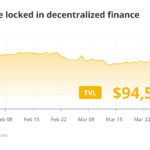Recent discussions in the cryptocurrency world are highlighting a potential shift in Bitcoin’s market behavior, as its correlation with traditional stocks appears to be weakening. Various experts are weighing in on this evolving narrative, suggesting that Bitcoin is now increasingly seen as a reflection of the broader crypto market instead of a safe-haven asset like digital gold.
According to Bloomberg, signs indicate that Bitcoin’s relationship with stocks, particularly technology shares, may not hold as strongly as it once did. This change could signal a significant decoupling, as Bitcoin begins to trade on its own terms rather than following the trends of traditional financial markets. Decrypt elaborates on this dynamic, noting that experts believe we might be on the brink of a “violent decoupling” where Bitcoin and tech stocks no longer move in tandem.
Further insights from a Swiss crypto bank underscore this sentiment, suggesting that Bitcoin is increasingly viewed as a proxy for the entire cryptocurrency sector rather than being classified strictly as digital gold. This perspective highlights the evolving identity of Bitcoin within the financial landscape, one that emphasizes its role as an indicator of market movements rather than a safe investment alternative.
As these discussions unfold, industry watchers and investors alike are keenly observing how Bitcoin adapts to these changes and what implications this may have for the broader cryptocurrency landscape in the coming months.

Bitcoin’s Shifting Market Dynamics
Recent analyses have highlighted significant changes in Bitcoin’s behavior relative to traditional financial markets, particularly stocks. Here are the key points that illustrate these trends:
- Breaking Correlation with Stocks:
Bitcoin is showing signs of decoupling from stock market trends, indicating a potential shift in its role in investment portfolios.
- Expert Insights on Bitcoin’s Nature:
Market experts discuss why Bitcoin has been trading similarly to tech stocks, emphasizing its volatility and investor sentiment.
- Potential for Violent Decoupling:
Analysts predict a sharp divergence between Bitcoin and global markets, which may impact investors’ strategies and risk management.
- Bitcoin as a Crypto Market Proxy:
Swiss crypto banks suggest that Bitcoin is increasingly viewed as a reflection of the broader crypto market rather than a safe-haven asset like digital gold.
- Changing Investor Sentiment:
The perception of Bitcoin is evolving, which may lead to different investment behaviors among retail and institutional investors.
“The dynamics of Bitcoin’s trading pattern may significantly affect investment strategies in both cryptocurrencies and traditional markets.”
These developments could influence readers’ investment strategies, urging them to reconsider their portfolios in light of Bitcoin’s evolving role in financial markets.
Bitcoin’s Market Behavior: Signaling Change in Crypto Dynamics
The latest discussions surrounding Bitcoin, including its apparent divergence from traditional stock market trends, mark a pivotal moment in the cryptocurrency landscape. Early reports indicate that Bitcoin may no longer be mirroring movements in tech stocks, suggesting a potential separation phase. This shift is particularly intriguing for investors and analysts keenly observing the evolving correlation dynamics.
Competitive Advantages: Bitcoin’s new trajectory poses significant opportunities for discerning investors who are looking to capitalize on potential volatility. With experts predicting a “violent decoupling” from conventional market behaviors, those attuned to these signals might find themselves ahead of the curve. Cryptocurrency enthusiasts, especially those skeptical of Bitcoin as merely a speculative asset, could leverage this insight to redefine their strategies and solidify their positions within the broader finance ecosystem.
Competitive Disadvantages: However, this shifting perception may also introduce hurdles for traditional investors who have relied on Bitcoin as a hedge against market fluctuations. The notion that Bitcoin is more of a proxy for the entire crypto market rather than a safe haven akin to digital gold presents challenges for those seeking stability in their portfolios. Institutions that have placed large bets on Bitcoin as a stable asset might find themselves reassessing their strategies amid growing volatility.
Moreover, retailers and businesses that have started investing in Bitcoin to diversify their financial strategies could face risks as this decoupling unfolds. A potential decline or unusual market behavior could deter mainstream adoption or encourage caution among hesitant businesses.
For those involved in the crypto sector—especially emerging investors—this fluctuation can serve as a double-edged sword. While early adopters may find themselves at an advantage with agile strategies, newer participants could struggle to interpret the changing landscape. The indication that Bitcoin is more closely aligned with market sentiment rather than intrinsic value underscores the need for education and adaptation in trading tactics.

















